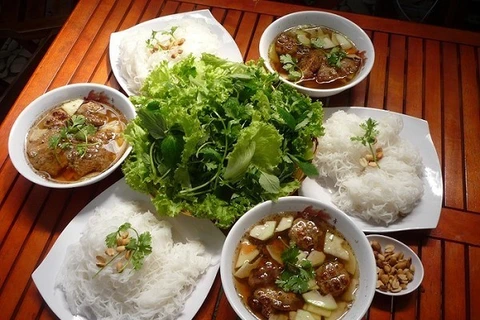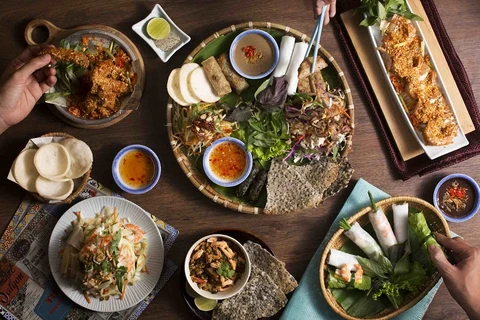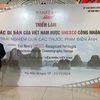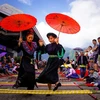Hanoi (VNA) – Vietnamese and Japanese chefs are set to serve a unique fusion of street food of the two countries within the framework of the Japanese Culture Festival which is scheduled to take place in Hanoi next month.
According to the Japanese Embassy in Hanoi, on the occasion of the 50th anniversary of the establishment of Vietnam-Japan diplomatic relations, Japan will carry out a street food initiative to promote the culinary culture of both sides.
Under the project, two Vietnamese and one Japanese chefs will create new dishes which combine traditional Vietnamese and Japanese processing methods and ingredients to show the friendship of the two nations in culinary culture.
Recipes of those six original dishes will be introduced on the organising board’s website at https://jp-culinaryfes.vn, along with an online vote.
Accordingly, chef Shinobu Ito, a researcher of Vietnamese cuisine in Japan, will bring in two street dishes made from simple ingredients but typical of both cuisines, including Okonomiyaki-flavored grilled rice paper and grilled rice balls flavored with fish sauce.
Two Vietnamese chefs Huynh Thanh Lam and Nguyen Ba Phuoc will present dishes that are variations of popular Vietnamese street food combined with Japanese flavors, including sweet potato cakes with cod in spicy sauce, sea bass fillet sandwiches, lotus root tempura and grilled chicken skewers with spicy miso sauce.
Among the six dishes created by three chefs, the three dishes with the most votes will be served at the Japanese Cultural Festival held in Hanoi in November.
 The three Japanese and Vietnamese chefs with their dishes presented on the event’s website. (Photo: website screenshot)
The three Japanese and Vietnamese chefs with their dishes presented on the event’s website. (Photo: website screenshot) In addition, the organisers will also give out free e-books with recipes for these six dishes along with instructions from the chefs on how to cook them.
Through the culinary sharing event and introduction of the recipes, the organizers hope that people in both countries will be able to taste these dishes, and at the same time hope that these dishes will become household food in both countries in the coming years.
The Japanese Cultural Festival is scheduled to open in Hanoi on November 12 with several unique cultural, culinary and music exchanges.
The World Food Tourism Association (WFTA) estimates that up to 81% of international tourists want to explore local cuisine. They are willing to spend an average of 25-35% of their travel budget on food and beverage related expenses during their journey.
The statistic shows that food not only fulfills the daily needs of tourists, but has also emerged as a significant experiential aspect of travel, strongly influencing their destination choices. Hence, there is ample reason for Vietnam to leverage its culinary strengths to enhance its appeal as a tourist destination, particularly by actively engaging in diplomatic activities with other countries.
In recent times, Vietnamese cuisine has garnered significant recognition from international agencies and organizations. Notably, the esteemed American travel site Travel + Leisure has rated Vietnam as a captivating culinary destination in Asia for 2023. Furthermore, readers of the world's largest travel platform, Tripadvisor, have voted Hanoi as one of the top 20 culinary destinations worldwide for 2023.
In the past, numerous renowned Vietnamese dishes such as Pho (Noodle), Banh Mi, Bun Cha (Grilled pork with Vermicelli Noodle), and Banh Cuon (Steam Rice Rolls) have received praises from prestigious international media outlets. Moreover, cuisine is now receiving increased attention in the design and promotion of tourism products.
Travel agencies have embraced the concept of Culinary Tourism and are organizing culinary tours for visitors to indulge in and explore the local cuisine of their destinations. However, these activities are currently limited in scale. The recognition from international sources and the development of tour products among tourism businesses serve as further evidence that Vietnamese cuisine is a valuable resource that contributes to creating advantages and enhancing national competitiveness on the global tourism map./.























